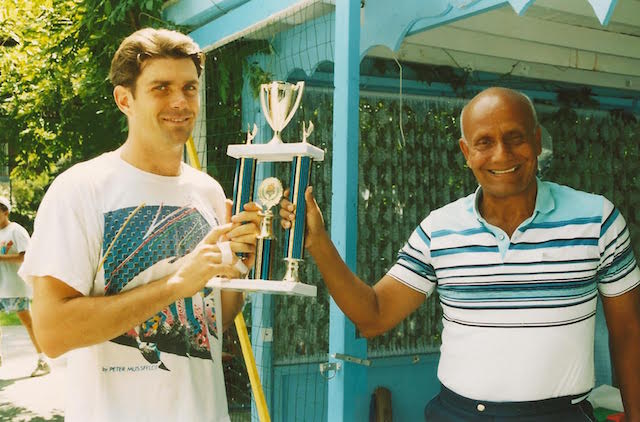
I was 23 and standing in the bathroom trying to put on my tie for my grandfather’s funeral.
I was already pissed off at life for taking him away from our family and now my Windsor knot was refusing to adjust as I needed.
I was frustrated and had enough of things not going my way. In need of release, I decided to punch shut the swinging glass shower door. Unfortunately I swung too hard and my fist went right through the glass, rather than slamming the door as I had hoped, spraying broken glass through the bathroom and slicing open two inches of my hand. I did the reading at the church that day with a throbbing, bandaged hand and my self-esteem in the gutter.
Yoga has antidotes for every ailment that we encounter. It offers a system of psychology and living that offers practical and effective antidotes to our daily maladies. In the practice of aparigraha, the non-receiving of gifts, I found an antidote to my years of frustration arising from unfulfilled expectations.
Yoga is often presented, thanks to the work of the ancient Indian sage Patanjali, as having eight limbs or aspects. His writing is called the Yoga Sutras. There are many translations and interpretations of the Yoga Sutras available. My favorite is by Swami Vivekananda and is entitled Raja Yoga.
Yoga is organic, not linear; hence all of the limbs of yoga are distinct, yet intertwined. The first of the limbs is called the yamas, and can be thought of as moral or ethical injunctions. This is the foundation of the yoga practice. One of the five yamas is aparigraha, which literally means: the non-receiving of gifts.
The Yoga Sutras were most likely written for the sanyassin, a seeker who has renounced all material possessions and attachments in order to find the Ultimate Reality. Hence the mandate: “Not to receive gifts.” This is the type of discipline usually applied to monastic orders, or those who have cut off their contact with society.
This does not mean that aparigraha is irrelevant to those engaged with worldly activities. It is still relevant, but more so at the mental and heartfelt level than on the physical. Giving and receiving is part of life in society. The issue becomes our state of consciousness when giving and receiving. Also, the giver does not have to be a person. The giver can be Life itself!
My teacher, Sri Chinmoy, used to say: “Peace begins when expectation ends.” I would add that frustration stems from unfulfilled expectations. What aparigraha teaches me is to not attach expectations to the experiences life gives me.
With every gift arises, both in the giver and the receiver, a web of expectations and attachments. The giver gives with expectations. The receiver allows themselves to be bound by the expectations of the giver. Think of your own life and how often you do things not because you really want to, but because you feel that it is expected of you. This becomes a vicious, never-ending cycle. Aparigraha teaches that giving and receiving can be done without expectation.
Back to my grandfather’s passing. My expectation was that life should give me pleasant experiences. When my grandfather dies it is not a pleasant experience: its painful, it hurts and, quite frankly, it sucks! That’s when my frustration arises: I am not getting the experience I want. My frustration led to destruction.
In my day-to-day life I also bring expectations into my actions. Before I act I often ponder what others will think of me if I act a certain way. I think I know what they expect of me and I wonder if my actions will upset those expectations. This endless cycle is often founded upon completely incorrect assumptions about others and what they think and feel.
One evening after practicing yoga I glanced at the front page of the New York Times and saw the headline for yet another political scandal. I reflected on the idea of aparigraha. These two verses of poetry came to me as I walked home:
The politician looked down from on high
Thinking power was freedom;
But selling one’s soul to the highest bidder
I call bondage and defeat.
The yogi seeks the cure from this tangled web.
Gifts with strings bind the giver and the receiver.
Deep in measured breath: pranayama
The yogi finds liberation.
The Yoga Sutras say that when we practice aparigraha, we are able to see deep into ourselves, into our motivations and expectations. That clarity makes space for change.
Try to observe the expectations that arise both when you give and receive and try to replace your expectations with unconditional giving and receiving.
Namaste!
Relephant:
A Yoga Sutras Makeover.
~
Author: Sujantra Mc Keever
Editor: Catherine Monkman
Photo: Author’s Own






Read 10 comments and reply